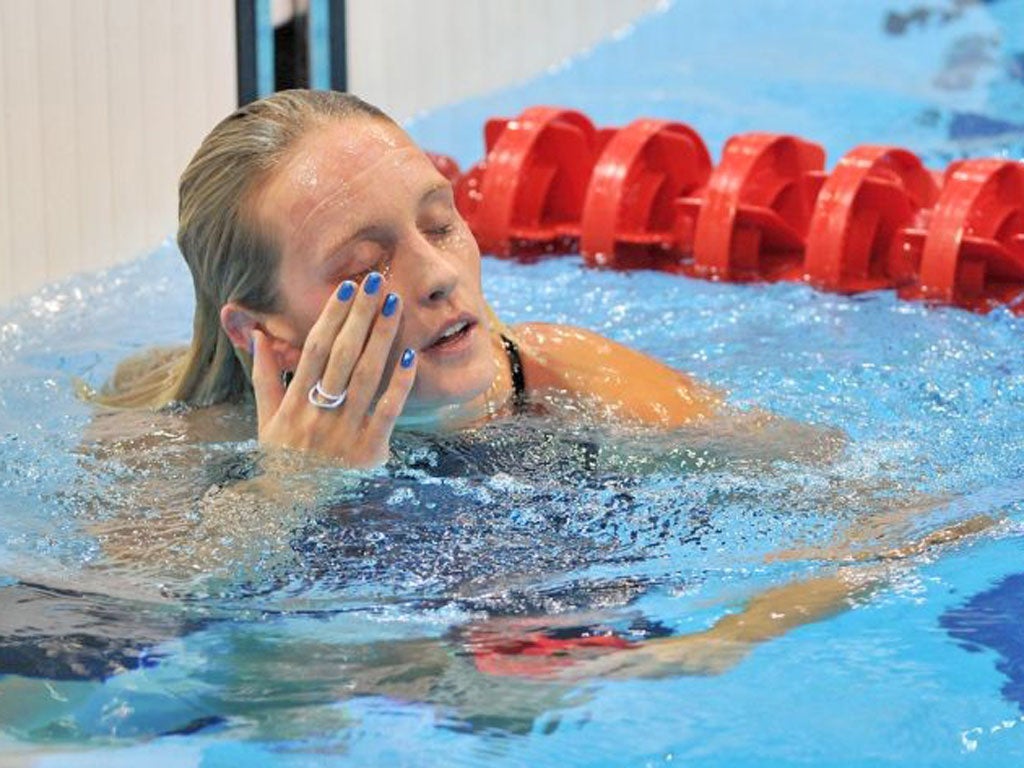Funding faces cuts as home pressure sinks British team at the Aquatics Centre
Lack of home success in the pool means UK Sport set to divert money elsewhere

Your support helps us to tell the story
From reproductive rights to climate change to Big Tech, The Independent is on the ground when the story is developing. Whether it's investigating the financials of Elon Musk's pro-Trump PAC or producing our latest documentary, 'The A Word', which shines a light on the American women fighting for reproductive rights, we know how important it is to parse out the facts from the messaging.
At such a critical moment in US history, we need reporters on the ground. Your donation allows us to keep sending journalists to speak to both sides of the story.
The Independent is trusted by Americans across the entire political spectrum. And unlike many other quality news outlets, we choose not to lock Americans out of our reporting and analysis with paywalls. We believe quality journalism should be available to everyone, paid for by those who can afford it.
Your support makes all the difference.It was boisterous and noisy in the Aquatics Centre on Saturday night as the crowd rose to acclaim the greatest Olympian for one final time. Michael Phelps, of course, delivered on his side of the deal, adding an 18th gold medal but the rapture served another purpose as well – it drowned out the roars coming from across the Olympic Park where Britain's athletes were producing their greatest night of this or any Games.
While the athletics team were eagerly seizing their moment at the first opportunity the swimmers were completing a disappointing programme. One silver and two bronze – with one possible gold to come in open-water swimming – matches the number of medals from the pool in Beijing but it is not an adequate return.
Where by and large the athletes, from heats onwards, look to have been inspired from the moment they stepped into the stadium, for many of the swimmers the reverse has been the case. Rebecca Adlington, who deserves credit for her two bronze medals, admitted that some of the team did find it all overwhelming.
There were only two moments when British swimmers noticeably bounced out of the call room looking like they could not wait to get into the water. The first was Michael Jamieson, the Glaswegian breaststroker, who beamed and waved as he came out for the 200m breaststroke final.
He produced the swim of his life, the best British swim of the Games, and it took a world record to deny him gold. He celebrated his 24th birthday yesterday and in his event can expect to still be a force come Rio in 2016.
The other occasion came on the last race of the week when Liam Tancock charged out of the call room with the medley relay team, including Jamieson, and sure enough the quartet finished a surprise and creditable fourth. The rest though was, with the exception of Lizzie Simmonds' fourth place in the 200m back, not good enough.
"I'm very proud of the way the swimmers kept on fighting and never gave up until the last race," said Michael Scott, the performance director. "But at the end of the day we are judged on medals. We have three medals in the pool – which matches Beijing but it is below what we expected."
Britain did achieve more finalists than Beijing, 18 from 47 swims, and only Australia managed a greater number of finalists at these Games. That is tempered with the failure of the likes of Hannah Miley, Fran Halsall and Ellen Gandy to deliver not only medals but to improve on their swims at the trials in the Olympic pool in March. It was those performances that engendered genuine hope of meeting the medal target of five to seven. But none of them bettered their trial times, where Halsall's time in the 50m freestyle would have won her Olympic silver.
In December Scott will discover whether his funding from UK Sport is to be reduced. Swimming is one of the best provided for sports – it receives only £3,400 less than athletics. The overall figure of £25m may now very likely be cut, especially with the success in other sports, like canoeing – UK Sport decide their funding levels based to a large extent on how many medals are won. The other concern for Scott is that among the Olympic team there are not many who will still be challenging for medals in four years time. The breaststrokers Jamieson, Andrew Willis and Craig Benson should be, as may Simmonds.
Adlington looks set to hang up her goggles – and if she does should be applauded as Britain's greatest swimmer – while Halsall and Miley will be 26 and 27 respectively. As Ye Shiwen, Missy Franklin and, in particular, Katie Ledecky showed, this has become not so much a women's sport as a girls' game.
Join our commenting forum
Join thought-provoking conversations, follow other Independent readers and see their replies
Comments